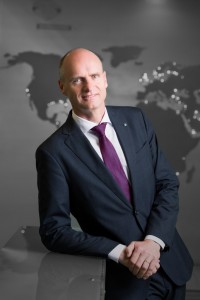Keeping cool in the hot seat CFO takes the long view
Mikael Leijonborg, the Chief Financial Officer of GAC Group, a global provider of integrated shipping, logistics and marine services, recently spoke to us about the challenging timse in which we live and how business is best suited taking the long view.
Mikael Leijonberg speaks with analytical focus and measured certainty, qualities that are desirable in any Chief Financial Officer. This is particularly so in turbulent time likes those now challenging GAC and its customers. “This situation for the GAC Group is neither dire nor hopeless, nor bright and rosy,” he says. “And we are not unique in this regard. Global markets are cyclical and currently in a challenging condition. Few companies are presenting totally joyful financials in these times.”
Since his appointment as GAC Group CFO in April 2016, Leijonberg has been calmly assessing what’s needed to maintain the Group’s long record of financial stability. He’s introduced a suite of internal reforms to streamline reporting processes and equip his own team and GAC’s operating companies with the right tools for the job.
Belief
Leijonberg maintains that fiscal caution can be compatible with the calculated risks required when investing for long-term growth. As such, the Group’s investments in 2016 amounted to approximately $65 million by the end of the September quarter. They included funds for new warehouses in Asia and the Middle East and new vessels for the Gulf and the United Kingdom. “Business opportunities are still out there in hard times,” he says. “It’s a matter of seeing past the problems and revealing the growth options.”
Business effort now
Leijonberg says now is not the time to be sitting back and watching. “Even more effort has to be put into business development,” he says. “You can’t rely on the business you already have. You have to take risks. But it’s just basic common sense to make sure you understand those risks and can tolerate the impact of failure. You always have to ask yourself: ‘What if this fails?’.”
Supporting development in the Middle East
The coming decades will require innovative enterprises that can adapt to the Middle East’s changing markets and deliver projects vital to its development. A key element of the evolution of GAC’s business is the delivery of innovative products with world-class partners, to meet the challenges faced by the shipping industry. An example of this is GAC EnvironHull’s eco-friendly, diver-free underwater hull cleaning system, HullWiper, offered in the United Arab Emirates and on an ad hoc basis at other key locations in the Middle East. The technology delivers the benefits of a foul-free hull with little or no down-time, whilst preserving both the delicate marine eco-system and reducing the risk to human life. It uses water jets to remove fouling rather than brushes or other abrasives which can damage expensive coatings and collects debris from the operation for environmentally approved disposal on land, reducing the risk of cross-pollination of waters with alien species. In November 2016, the Dubai Maritime City Authority recognised HullWiper for its “exemplary role” in enriching the Emirate’s maritime sector’s culture of innovation and excellence, as part of the Dubai Maritime Innovation Awards.
The long game
Leijonberg compares financial performance to the weather, with strong climatic forces underlying day-to-day variations which affect particular sectors or companies. “We have to play the long game,” he says. “We have considerable assets worldwide and we expect them to yield higher returns as markets improve.” The GAC Group is able to play the long game due to its strong asset base with a healthy solvency. That means it has a lower exposure to creditors. It’s a solid bedrock on which to build and grow.
Coming out of the back room
Leijonberg is no back room accountant. He sees a company’s financials as critical to its commercial success. He believes that financial managers should be business-orientated and work closely with company managers to help achieve that success. They can offer a different perspective and insight, even on matters outside the traditional realm of finance. Their presence at the negotiating table sends a strong message about commitment to sound fiscal policy and practice. “You do not need advanced finance skills to be a successful company manager. They should be appointed for their skills in leadership, change management, business acumen, commercial development, negotiation, etc,” he says. “They should know how to build a strong team with diverse skills, especially at times when they have to find ways to do more with less. They must have a sound understanding of accounting and finance, but they don’t need to be a financial expert. “A strong finance manager is thus a core asset in any company. More should involve themselves in the business side.” And it sounds as if on Leijonberg’s watch, more will.
About GAC
GAC Group, headquartered in Dubai, is a global provider of integrated shipping, logistics and marine services. Emphasising world-class performance, a long-term approach, innovation, ethics and a strong human touch, GAC delivers a flexible and value-adding portfolio to help customers achieve their strategic goals. Established since 1956, the privately-owned group employs over 9,000 people in more than 300 offices worldwide.
www.gac.com
About Mikael Leijonberg
Born in Ystad at the southern tip of Sweden 51 years ago, Mikael Leijonberg joined GAC in Germany in 1994 from the Stockholm office of Arthur Andersen. In 1996, he moved to the Middle East to join the Group’s largest operation, GAC Dubai. From 2004 to 2010 he was in charge of finance at GAC Dubai. In 2011 he became Managing Director at GAC Bahrain. He returned to the Group’s Corporate HQ in Dubai in 2015 as Deputy CFO and was appointed Group Chief Financial Officer in April 2016.













